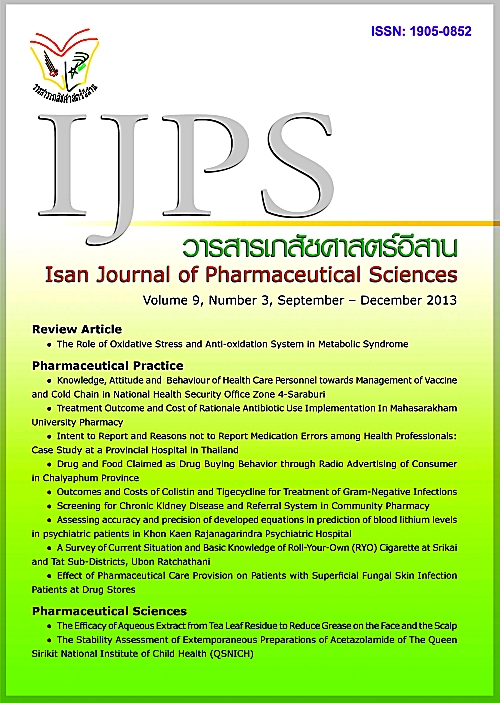Intent to Report and Reasons not to Report Medication Errors among Health Professionals: Case Study at a Provincial Hospital in Thailand.
Main Article Content
Abstract
Introduction : Medication error reporting was the important tool to use improve quality of health services. Health Professionals were must to learn about seeking medication error, root cause analysis and management system for decrease patient risk. But not reporting medication errors were often problem and data was not utilization. Materials and Methods : The objectives of this research were to examine intent to report and explore reasons for not reporting medication errors among health professionals. Self-reported questionnaires were administered in this survey research. The total participants (n=196) were doctors, pharmacists and nurses who are practicing at Provincial Hospital in Thailand. Data were analyzed by using statistic inferences including mean, standard deviation, percentage, chi-square test and Kruskal Wallis test. Result : The results of the study revealed that all the health professionals were likely to have higher intent to report when the medication errors were more severe. Nevertheless, the physicians gave a higher priority to report those near miss cases more than the other health professionals.The main reasons for not reporting included the high workload that made them busy and forget to report and, fears of being mentioned or blamed from their supervisor, especially among the nurses and pharmacists. However, the physicians did not report the medication errors because they were not certain whom they should report the cases to. Conclusion: The result suggested that some strategies are essential in order to encourage health professionals to report the medication errors more properly including the organization culture and value that instill their support in medication error reporting.
Article Details
In the case that some parts are used by others The author must Confirm that obtaining permission to use some of the original authors. And must attach evidence That the permission has been included
References
Aspde P, Wolcott J, Bootman J, Cronenwett L. Preventing medication error. Washington, DC: THE NATIONAL ACADEMIES PRESS; 2007.
Brown M. Managing Medication Errors by Design. Critl Care Nurs Q 2001; 3: 77-79.
Bunprasop S. (2005). Attitude towards risk management climate and risk management practice in medication error of professional nurses at Maharat Nakon Si Thamarat hospital. Master of Nursing Science Program in Nursing Administration 2005, Burapa University.
Chiang H, Pepper G. Barriers to Nurses’ Reporting of Medication Administration Errors in Taiwan. JNS 2006; (38): 392-399.
Cohen R. Why error reporting systems should be voluntary. BMJ 2000; 320: 728-729.
David U. Medication Error Reporting Systems: Problems and Solutions. New Medicine 2001; 2(1): 61-65.
Dennison R. A Medication Safety Education Program to Reduce the Risk of Harm Caused by Medication Errors. J Contin Educ Nurs 2007; 4: 176-184.
Dowsodsai P, Jhandarak N. The associations of alike drugs, adjacent drugs, poly-drugs prescriptions and period of pharmacy services to the risk of medication errors in pharmacy dispensing : case study in pharmacy department, Sai mun hospital. IJPS 2010; 6(2): 44-51.
Elder N, Grabam D, Brandt E, Hickner J. Barriers and Motivators for Making Error Reports from Family Medicine Offices: A Report from the American Academy of Family Physicians National Research Network (AAFP NRN). J Am Board Fam Med 2007; (20): 115-123.
Evans S, Berry J, Smith B, Esterman A, Selim P, Shaughnessy J, Dewit M. Attitudes and barriers to incident reporting: a collaborative hospital study. Qual Saf Health Care 2005; (15): 39-43.
Kingston M, Evan S, Smith B, Berry J. Attitudes of doctors and nurses towards incident reporting: a qualitative analysis. MJA. 2004; 36-39.
Lawton R, Parker D. Barriers to incident reporting in a healthcare system. Qual Saf Health Care 2002; (11): 15-18.
Ningsanon T, Jurawuttanaton S, Montakantikul P, editors. Prevention of medication error for Patient safety. Bangkok: Prachachon; 2004.
Propunwattana, M. Development of a medication safety system through knowledge management: a case study of a private hospital. Doctor of Public Health, Department of Health Education 2004, Mahidol University.
Reason J. Human error: models and management. BMJ 2000; (320): 768-770.
Terzibanjan A, Laaksonen R, Weiss M et al. Medication Error Reporting Systems-Lessons Learnt [online]. 2008 [cited 2009 Aug 15]. Available from: http://www.fip.org/files/fip/Patient%20Safety/Medication%20Error%20Reporting%20-%20Lessons%20Learnt2008.pdf
Vincent C, Stanhope N, Murphy M. Reasons for not reporting adverse incidents: an empirical study. J Eval Clin Pract 1998; 5(1): 13-21.


